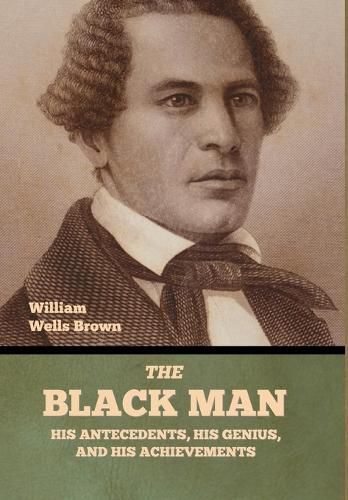Readings Newsletter
Become a Readings Member to make your shopping experience even easier.
Sign in or sign up for free!
You’re not far away from qualifying for FREE standard shipping within Australia
You’ve qualified for FREE standard shipping within Australia
The cart is loading…






This title is printed to order. This book may have been self-published. If so, we cannot guarantee the quality of the content. In the main most books will have gone through the editing process however some may not. We therefore suggest that you be aware of this before ordering this book. If in doubt check either the author or publisher’s details as we are unable to accept any returns unless they are faulty. Please contact us if you have any questions.
The Black Man: His Antecedents, His Genius, and His Achievements is a book published in 1863 by William Wells Brown which sketches the lives of individuals Brown determined had by their "own genius, capacity, and intellectual development, surmounted the many obstacles which slavery and prejudice have thrown in their way, and raised themselves to positions of honor and influence".
About the author
William Wells Brown (November 6, 1814 - November 6, 1884) was an American abolitionist, novelist, playwright, and historian. Born into slavery near Mount Sterling, Kentucky, Brown escaped to Ohio in 1834 at the age of 19. He settled in Boston, Massachusetts, where he worked for abolitionist causes and became a prolific writer. While working for abolition, Brown also supported causes including: temperance, women's suffrage, pacifism, prison reform, and an anti-tobacco movement. His novel Clotel (1853), considered the first novel written by an African American, was published in London, England, where he resided at the time. It was later published in the United States.
Brown was a pioneer in several different literary genres, including travel writing, fiction, and drama. In 1858 he became the first published African-American playwright, and often read from this work on the lecture circuit. Following the Civil War, in 1867 he published what is considered the first history of African Americans in the Revolutionary War. He was among the first writers inducted to the Kentucky Writers Hall of Fame, established in 2013. A public school was named for him in Lexington, Kentucky.
Brown was lecturing in England when the 1850 Fugitive Slave Law was passed in the US. As its provisions increased the risk of his capture and re-enslavement, even in northern states, he stayed overseas for several years. He traveled throughout Europe. After his freedom was purchased in 1854 by a British couple, he and his two daughters returned to the US, where he rejoined the abolitionist lecture circuit in the North. A contemporary of Frederick Douglass, Brown was overshadowed by the charismatic orator and the two feuded publicly. (wikipedia.org)
$9.00 standard shipping within Australia
FREE standard shipping within Australia for orders over $100.00
Express & International shipping calculated at checkout
This title is printed to order. This book may have been self-published. If so, we cannot guarantee the quality of the content. In the main most books will have gone through the editing process however some may not. We therefore suggest that you be aware of this before ordering this book. If in doubt check either the author or publisher’s details as we are unable to accept any returns unless they are faulty. Please contact us if you have any questions.
The Black Man: His Antecedents, His Genius, and His Achievements is a book published in 1863 by William Wells Brown which sketches the lives of individuals Brown determined had by their "own genius, capacity, and intellectual development, surmounted the many obstacles which slavery and prejudice have thrown in their way, and raised themselves to positions of honor and influence".
About the author
William Wells Brown (November 6, 1814 - November 6, 1884) was an American abolitionist, novelist, playwright, and historian. Born into slavery near Mount Sterling, Kentucky, Brown escaped to Ohio in 1834 at the age of 19. He settled in Boston, Massachusetts, where he worked for abolitionist causes and became a prolific writer. While working for abolition, Brown also supported causes including: temperance, women's suffrage, pacifism, prison reform, and an anti-tobacco movement. His novel Clotel (1853), considered the first novel written by an African American, was published in London, England, where he resided at the time. It was later published in the United States.
Brown was a pioneer in several different literary genres, including travel writing, fiction, and drama. In 1858 he became the first published African-American playwright, and often read from this work on the lecture circuit. Following the Civil War, in 1867 he published what is considered the first history of African Americans in the Revolutionary War. He was among the first writers inducted to the Kentucky Writers Hall of Fame, established in 2013. A public school was named for him in Lexington, Kentucky.
Brown was lecturing in England when the 1850 Fugitive Slave Law was passed in the US. As its provisions increased the risk of his capture and re-enslavement, even in northern states, he stayed overseas for several years. He traveled throughout Europe. After his freedom was purchased in 1854 by a British couple, he and his two daughters returned to the US, where he rejoined the abolitionist lecture circuit in the North. A contemporary of Frederick Douglass, Brown was overshadowed by the charismatic orator and the two feuded publicly. (wikipedia.org)